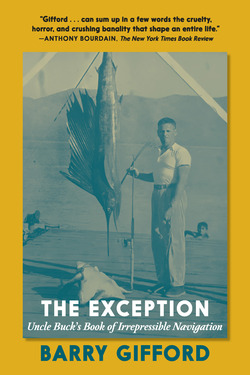Barry Gifford's three Southern Gothic novels, Night People, Arise and Walk, and Baby Cat-Face, may be among the weirdest and best of Gifford's novels for their sheer velocity--the copious, raw violence; the invented religions and gods that make people do things; and how the horrors somehow cohabit—affably—with the genuine pathos and loveliness of the unforgettable characters that live in these books and the things they say so easily that we've never heard anyone say before. God in these Southern Nights is only another possibly deranged near relative, cast in the only nonspeaking part in this human drama. Everyone else talks and talks. And it's the dialogue in these novels that make them some of Gifford's best, reminders of the author's seemingly unlimited range and versatility, a comic-tragic genius for our time.
As a character in Night People says, "Safety first ain't never been my motto."
Collected in
The Best of Barry GiffordExclusive: An Excerpt from Barry Gifford's Southern Nights
APACHES
Big betty stalcup kissed Miss Cutie Early on the right earlobe as Cutie drove, tickling her, causing Cutie to swerve the black Dodge Monaco toward the right as she scratched at that side of her head.
‘Dammit, Bet, you shouldn’t ought do that while I’m wheelin’.’
Big Betty laughed and said, ‘We’re kissin’ cousins, ain’t we? Sometimes just I can’t help myself and don’t want to. Safety first ain’t never been my motto.’
Cutie straightened out the car and grinned. ‘Knowed that for a long time,’ she said.
‘Knowed which? That we was kissin’ cousins?’
‘Uh uh, that come later. About the safe part. You weren’t never very predictable, Bet, even as a child.’
Big Betty and Miss Cutie had spent the week in New Orleans, then the weekend in Gulf Shores, Alabama, and were headed back into Florida at Perdido Key. The Gulf of Mexico was smooth as glass this breezeless, sunny morning in February.
‘Jesus H. Christ, Cutie, tomorrow’s Valentine’s Day!’
‘So?’
‘We’ll have to make somethin’ special happen.’
‘Last Valentine’s we was locked up at Fort Sumatra. Spent the whole day bleachin’ blood and piss stains outta sheets.’
‘Still can’t believe we survived three and change in that pit.’
‘Don’t know if I’d made it without you, Bet. Them big ol’ mamas been usin’ me for toilet paper, you weren’t there to protect me.’
Big Betty shifted her five-foot-eight, two-hundred-pound body around in the front passenger seat so that she faced Cutie Early. At twenty-four, Cutie was twelve years younger than Betty, and Miss Cutie’s slim-figured five-foot-one-inch frame engendered in Big Betty a genuinely maternal feeling. They had been lovers ever since Miss Cutie had tiptoed into Big Betty’s cell at the Fort Sumatra Detention Center for Wayward Women, which was located midway between Mexico Beach and Wewahitchka, Florida, just inside the central time zone. Cutie’s curly red hair, freckles, giant black eyes and delicate features were just what Betty Stalcup had been looking for. It was as if the state of Florida penal system had taken her order and served it up on a platter. Big Betty brushed back her own shoulder-length brown hair with her left hand and placed her other hand on Cutie’s right breast, massaging it gently.
‘You’re my baby black-eyed pea, that’s for sure,’ said Betty. ‘We ain’t never gonna be apart if I can help it.’
‘Suits me.’
‘Cutie, we just a couple Apaches ridin’ wild on the lost highway, the one Hank Williams sung about.’
‘Don’t know that I’ve ever heard of it.’
‘Travelin’ along the way we are, without no home or reason to be or stay anywhere, that’s what it means bein’ on the lost highway. Most folks don’t know what they want, Cutie, only mostly they don’t even know that much. Sometimes they think they know but it’s usually just their stomach or cunt or cock complainin’. They get fed or fucked and it’s back to square one. Money makes ’em meaner’n shit, don’t we already know. Money’s the greatest excuse in the world for doin’ dirt. But you and me can out-ugly the sumbitches, I reckon.’
‘How’s that?’
‘Just by puttin’ two and two together, sweet pea, then subtractin’ off the top, one at a time.’
‘I ain’t sure I understand you, Bet, but I’m willin’ to learn.’
Big Betty threw back her head, shut her wolfslit green eyes and gave out a sharp laugh.
‘Young and willin’s the best time of life,’ she said. ‘You got to play it that way till you can’t play it no more.’
‘Then what?’ asked Cutie.
Big Betty grinned, threw her heavy left arm around Cutie’s narrow shoulders and squeezed closer to her companion.
‘Start cuttin’ your losses,’ she said. ‘All that’s left to do.’
‘Along with cuttin’ throats, you mean.’
‘Why, Miss Cutie, honey, you way ahead of me.’


























